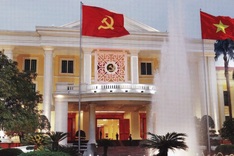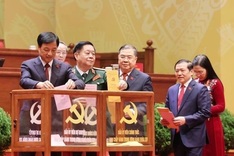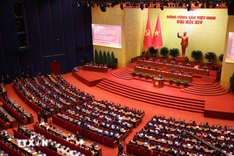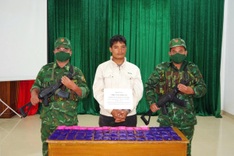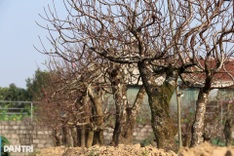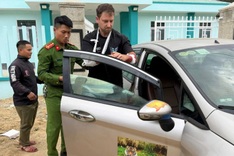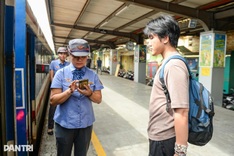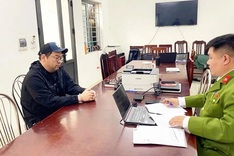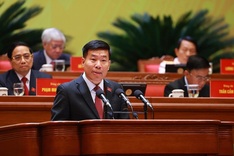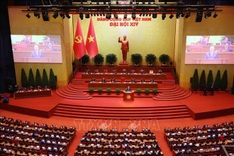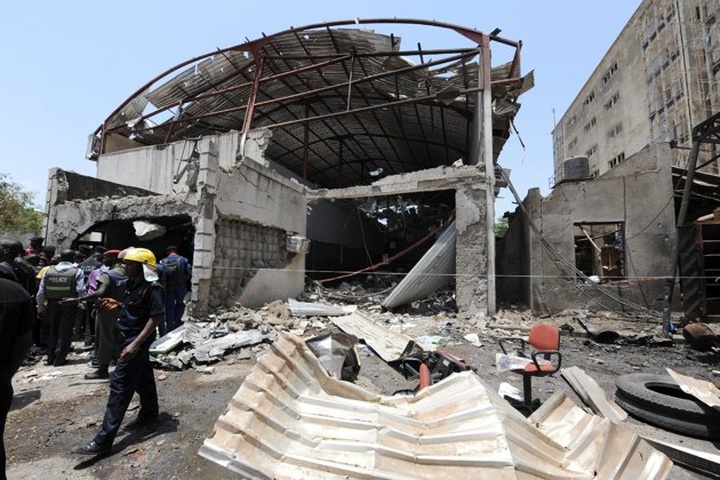 |
| A firefighter stands in front of the office of ThisDay newspaper in Abuja. |
The attack in the capital Abuja saw a suicide bomber drive into the back of the building belonging to ThisDay, one of the country's most prominent and influential papers.
Five people were killed, including the bomber, while eight were wounded at the privately-owned paper, ThisDay said in a statement, which called it an "attack on journalism."
In Kaduna, one of the main cities in the north, a bomb went off outside a complex housing a number of newspaper offices, including for ThisDay. An attacker also drove his car onto the premises, which later exploded.
Four people were killed in Kaduna, while 19 were wounded, a rescue official said on condition of anonymity.
Secret police said in a statement there were two people in the car in the Kaduna attack, with one caught by civilians as he sought to flee and handed over to authorities.
He was identified as Umaru Umaru Mustapha from Maiduguri, the base of Islamist group Boko Haram.
A purported spokesman for the Islamist group had recently made threats against news media outlets, saying they were being used by authorities to publish stories against Boko Haram.
President Goodluck Jonathan, currently attending a regional summit in Ivory Coast, condemned the attacks, as did the United States, saying that they targeted "free speech itself".
State Department spokeswoman Victoria Nuland said that it was up to Nigeria to determine the culprits of the attacks but voiced solidarity with concerns about Boko Haram.
The US embassy in Nigeria warned last week that Boko Haram might be planning attacks against hotels or other areas in Abuja, but the government sought to downplay the concerns.
Thursday's loud blast in Abuja shook the area, sending smoke billowing into the air and causing panic, with memories of a suicide bombing of UN headquarters in the Nigerian capital in August still fresh.
"The suicide bomber came in a jeep," the chairman of ThisDay's editorial board, Olusegun Adeniyi, told reporters at the scene.
"(Security guards) opened the gate for them ... The guy drove in through the gate and rammed into the building and exploded."
The attack hit the area housing the printing press, some distance away from the newsroom, and blew the roof off there. The paper said the dead included a security guard, three passers-by and the bomber.
The newspaper is based in the economic capital Lagos, but has a major operation in the capital Abuja.
Its owner, Nduka Obaigbena, is a high-profile figure who sponsors glitzy events with speakers who have included ex-US president Bill Clinton, among others. Major pop stars have appeared at his festivals in Nigeria and elsewhere.
In Kaduna, witnesses reported a chaotic scene where an attacker threw a bomb outside a complex housing newspaper offices, while his car was driven onto the premises.
The bomb outside the premises exploded, while the car later detonated.
A secret police statement, which provided slightly different details than witnesses at the scene, said one of the suspects -- Mustapha -- exited the car with a bomb, which he threw at two people. The blast killed them, it said.
He later "pulled out a pistol and fired several shots in the air in an attempt to escape".
"He was however caught and subdued by brave members of the public who refused to be intimidated and handed him over to security forces," the statement said.
It did not say what happened to the second suspect mentioned in the statement.
An AFP correspondent reported that police fired shots at the car after it had been left and it exploded twice. Authorities were later said to have discovered three gas cylinders and other explosive devices inside the car.
The explosion that went off later in the day in Kaduna saw a suspected Boko Haram member plant a bomb on a road which wounded three people, an emergency official said.
Boko Haram's insurgency, mainly in northern Nigeria, has killed more than 1,000 people since mid-2009.
It claimed responsibility for an August suicide bombing of UN headquarters in Abuja that killed at least 25 people.
The group's deadliest attack yet occurred on January 20 in the northern city of Kano, the country's second-largest, when coordinated bombings and shootings killed at least 185 people.
Nigeria, Africa's most populous nation and largest oil producer, is roughly divided between a mainly Muslim north and predominately Christian south.






